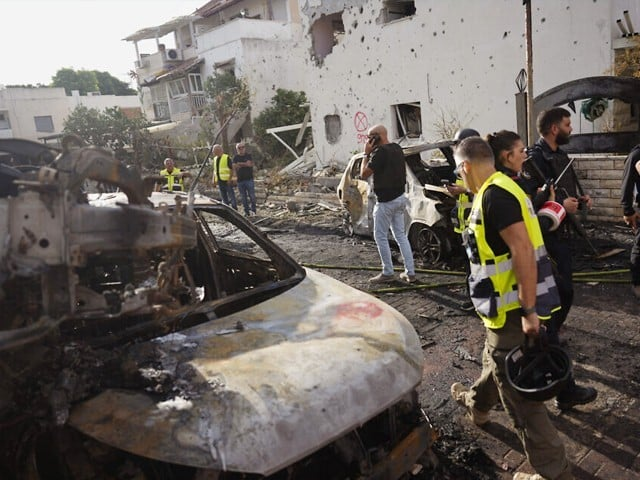Hezbollah, the Lebanese resistance group, launched a major attack on Israel, hitting Haifa and Ramat David Air Base with rockets in an unprecedented attack, as a retaliation for Israeli airstrikes in Lebanon that reportedly killed civilians.
The rockets targeted key locations within a 50-kilometre radius from the border, triggering air raid sirens across northern Israel urging civilians to seek shelter. The Israeli defence systems were reportedly unable to intercept Hezbollah’s rockets.
In a statement, Hezbollah stated that the barrage targeted military installations and critical locations using advanced Fadi 1 and Fadi 2 rockets, reaching deeper into Israel than any previous strikes. This marks the group’s farthest-reaching attack inside Israel since clashes between the two sides reignited in October last year.
However, the IDF reported no casualties or major damage as a result of the attack. In response, Israel expanded its military operations in Lebanon, claiming to have destroyed 400 Hezbollah rocket launchers.
Israel conducted a new wave of airstrikes on Hezbollah targets in southern Lebanon and warned of further military action. Earlier today an Israeli airstrike targeting Hezbollah commanders killed at least 37 people in Beirut, according to Lebanese authorities.
The strike, which leveled a residential building in the capital’s southern suburb, is the deadliest in nearly a year of escalating conflict between Israel and Hezbollah.
Hezbollah confirmed that 16 of its members, including senior leaders Ibrahim Aqil and Ahmed Wahbi, were among the dead.
Israel’s army stated it had targeted an underground meeting of Aqil and Hezbollah’s elite Radwan forces, claiming the attack severely weakened the group’s military command structure.
The strike also killed civilians, including three children and seven women, according to Lebanon’s health ministry.
Lebanon’s Health Minister Firass Abiad confirmed that children were among the victims as rescue crews continued combing through the rubble.
The Israeli military reported hitting around 180 targets, including rocket launch sites.
The ongoing hostilities come amid Hezbollah’s vow to continue fighting Israel until it agrees to a ceasefire in Gaza.
Lebanon’s Prime Minister Najib Mikati canceled his trip to the UN General Assembly in New York in response to the escalating situation, as diplomatic efforts to prevent a broader conflict in the region have so far been unsuccessful.
He accused Israel of “taking the region to war.”
Meanwhile, US National Security Adviser Jake Sullivan acknowledged the heightened risk of further escalation but praised the Israeli strike that killed Aqil, describing it as “justice” against Hezbollah, a group Washington has designated a terrorist organization.
With over 70 deaths in Lebanon this week alone, the conflict’s toll has risen to more than 740 since October.
The recent escalation follows multiple Israeli airstrikes on Lebanon over the past week including the pager attack, which resulted in the deaths of several high-ranking Hezbollah commanders. Hezbollah accused Israel of orchestrating a series of deadly pager explosions across Lebanon, which killed at least nine people and injured nearly 3,000, according to Lebanese health ministers.
Israel’s Mossad spy agency had planted explosives inside 5,000 pagers imported by Lebanese group Hezbollah months ago.
The explosions, which occurred in the capital Beirut and several other regions, have plunged the already volatile region into further chaos, with Hezbollah vowing to retaliate.
The blasts, caused by handheld pager devices used by Hezbollah members for secure communications, injured a wide portion of the population, including members of Hezbollah and Iran’s ambassador to Lebanon, Mojtaba Amani who lost an eye in the incident.
The Lebanese health ministry confirmed that 200 of the injured are in critical condition.
The group blamed Israel for what it described as “criminal aggression” and promised “just retribution”.



